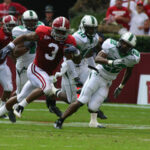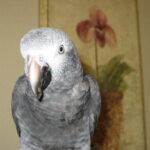Owning an African Grey Parrot is a lifetime commitment. The lifespan of an African Grey Parrot is upwards of 60 years. With proper diet and good health, your bird will be part of your last will and testament. When you purchase a pet with a long lifespan, you should be sure that you are in it for the long haul. An African grey parrot chooses one person to bond with usually, and that will be the only person who can handle it.
Choosing your African Grey Parrot
When you have made the decision to purchase an African grey, there are several things to consider. The most important is to understand that they are a lifetime commitment. The lifespan of an African Grey Parrot is upwards of 60 years. Make sure you have plenty of time to spend getting to know the bird. A young bird is best. A baby has not had a chance to become unsociable, or bond to any one person.
Feeding
African grey parrots are vegetarians. Although sometimes they will eat meat, it is not a steady part of their diets. Beans are the proper source of protein for them, along with fresh fruit and vegetables. Bird seed should be used sparingly and as treats, not as a staple of their diet. The fat content in seeds is so high that a steady diet of nothing but bird seed will greatly reduce your bird’s health and lifespan. Pellets can be purchased that contain all the necessary nutrients for your bird, but don’t expect her to be happy with nothing but pellets.
African greys require large amounts of clean, fresh drinking water. They will dip pellets into their water, give themselves baths, and generally make a mess of their water dish. It is necessary to clean and refill at least once daily.
Cages
You will need a large cage, a wrought iron cage with a birdy playground on top works nicely. Your cage will need to have 4 containers for food, water, treats, and fresh food. Two containers should be on the playground at the top. I use these for treats. This is where I put sunflower seeds, and nuts.
A separate playground perch is also a good idea. It will give her a change of environment and help to keep her from becoming bored. African greys can pluck their feathers if they become bored. A bird with ragged feathers is not very attractive, and infections can set in where they over-pluck and damage skin. Be prepared to spend at least part of your day, every day, entertaining your bird.
Talking
African grey parrots are the most prolific talkers of amazon parrots. Your bird will begin talking at about 1 year of age. When I purchased my grey, she could say hello and mimic the ringing of the telephone in the bird shop. It isn’t hard to teach new words to an African grey. They seem to pick things up without any effort.
Most birds have a squawk or screech noise that they make. This is their natural sound that they make in the wild. African greys do not have a squawk, unless they are mimicking the sound that another bird makes around them. I’ve heard that if you pay close attention you will hear the sound that they make naturally. I have never been able to tell what this is with my bird.
African grey parrots are a constant source of noise. They talk, whistle, and mimic any sound that they hear. They will copy your cough, your sneeze, the sound your dryer makes when it signals that your clothes are dry. They will copy the telephone ring, they will sing songs, and whistle tunes by putting the tunes you teach them into different melodies. They are a source of amusement, and sometimes, when you want quiet, and they don’t, annoyance. If you want your bird to stop making noise for a while, give her something to amuse herself with. She will spend her energy playing with whatever you give her, and give you a few minutes of quiet. Though they are talkative, I rarely find myself annoyed with the noise. I cover her at night, and she sleeps and is quiet. In the morning, until I uncover her cage, she will be quietly talking to herself. I believe this is when she practices new words.
Toys
African greys love to tear things up. They love wood, to chew on and to shred. You can purchase bird toys made for larger birds with wooden beads dangling and a bell that she can manipulate. A mirror is not a good idea. A mirror placed in an African grey’s cage will make her believe that she has another bird with her. She will love to play with the mirror and talk to it, but she will lose interest in you.
You can make toys for your bird, and save yourself lots of money. An African grey loves to rip paper to shreds. One toy you can make is a simple rolled newspaper, roll one whole section of the newspaper, and secure with string or a rubber band. Using scissors cut about 2 inches from the end toward the middle. Cut strips in both ends of the newspaper and fluff the loosened newspaper out. Secure the newspaper roll inside the cage, suspended from the top to hang near a perch that your bird likes to be on. Use any kind of string to hang the roll. Your bird will have hours of fun pulling apart the newspaper and shredding it.
Popsicle sticks also make a good toy. You can simply give her a stick to play with and tear up, or you can fashion several together to make a hanging toy. The thing to remember is variety. Give her new things to play with regularly to prevent boredom. When a bird is bored, they pluck feathers, or find other things to destroy that you might not want them to.
Sources:
http://www.avianweb.com/africangreys.htm
More by R.E. Roe
http://voices.yahoo.com/moving-day-dogs-point-view-10889657.html?cat=44
http://voices.yahoo.com/hummingbirds-las-vegas-11061730.html?cat=30
http://voices.yahoo.com/new-tank-syndrome-avoid-it-10851223.html?cat=7



